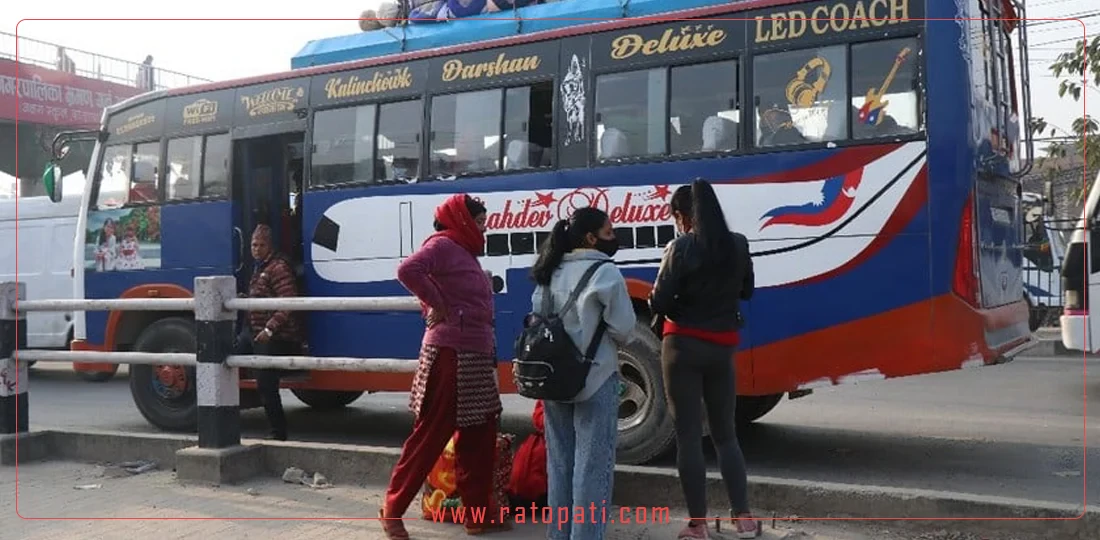Government to adjust public transport fares after Chhath

Kathmandu, September 27 — Public transportation fares have not been adjusted according to a scientific system for the past 16 months. The last adjustment was made by the government on May 16, 2023.
When adjusting public transport fares, the main criterion is that the market price of fuel must increase or decrease by 5 percent or more. If this happens, the Department of Transport Management has a system to automatically adjust public transport fares based on a scientific fare adjustment method. This system was initiated following a decision made on March 31, 2022.
Before the last fare adjustment, the price of diesel was NPR 172 on May 15, 2023. From May 16, the price was reduced by NPR 17 per liter to NPR 155. Based on this, the fare for passenger vehicles operating on national routes was adjusted down by 3.20 percent.
Similarly, freight vehicles operating on hilly roads had their fares reduced by 4.19 percent, and those on Terai roads by 4.65 percent.
Since then, despite the price of diesel fluctuating by more than 5 percent multiple times, transport fares have not been adjusted. The current price of diesel is NPR 149 per liter, but public transport fares remain unchanged from 16 months ago.
Previously, there had been little interest in adjusting public transport fares. However, after transport operators demanded fare increases targeting the festive season, an agreement was reached to adjust fares shortly after the festivals.
Bijay Swar, chairman of the Federation of Nepalese National Transport Entrepreneurs (FNNTE), stated that adjustments based on fuel price fluctuations have not occurred for the past three years. It has been agreed between the government and transport operators that fares will be adjusted after the Chhath festival. During discussions at the Ministry of Physical Infrastructure and Transport, operators raised the issue of fare increases, prompting Minister Devendra Dahal to direct the department to adjust fares.
According to him, the government policy includes annual fare adjustments in April based on market indicators other than fuel prices. Initially, the government made such adjustments in July, but later decided to do it in April to avoid appearing as if fare adjustments were being made during the festive season.
The decision to increase fares once a year in April was made three years ago. However, Swar indicates that not adjusting fares for three years has caused economic problems in the transport sector.
"When we demanded fare increases, it was alleged that operators were bargaining, so we did not specifically ask for fare increases. The government also did not implement any decisions," he said. "In Saturday's discussions, it was decided to make fare adjustments automatic."
Although a decision has been made to adjust fares in the first week after Chhath, the Department of Transport Management has not yet made a concrete decision on how much will be adjusted. According to their information officer, Ishwari Datta Paneru, fares for all types of vehicles, both short and long distances, will be adjusted based on studies.
He explained that a 5 percent fluctuation in fuel prices affects fares by 35 percent. Due to the lack of fare adjustments, there has been no adequate return on investments in vehicles. Recently, various issues have arisen in the transport sector, including unhealthy competition and vehicles being blacklisted by banks for failing to make payments.
"The profit margin on total fares is only 10 percent, yet there is a legal provision allowing up to 20 percent profit. The government is restricting us here as well," Swar said. "We are urging the government to allow a 15 percent profit margin. It has been three years since we asked for this adjustment."
Although a decision has been made to adjust fares in the first week after Chhath, there is no concrete decision on how much will be adjusted, according to the department's information officer. They plan to study and adjust fares for all vehicles based on distance.
The spokesperson for the Ministry of Physical Infrastructure and Transport, Sushil Babu Dhakal, stated that there is a demand for annual fare adjustments based on fluctuations in other market indicators, which indicates that studies need to be conducted.
"The demands from operators are commercially valid. They have the right to make requests," Dhakal said. "However, not all demands must be fulfilled. The Department of Transport Management will conduct studies based on the law and present suggestions to the ministry, after which decisions on fare adjustments will be made."









Leave Comment